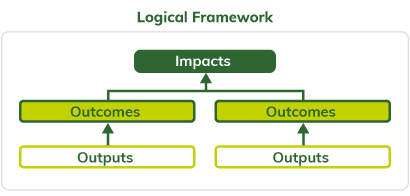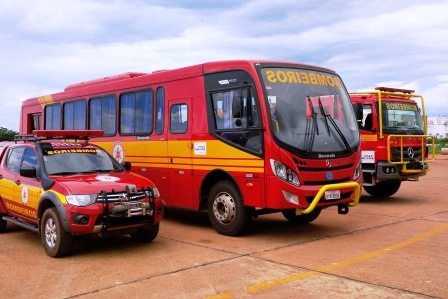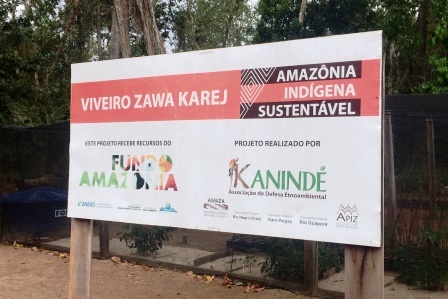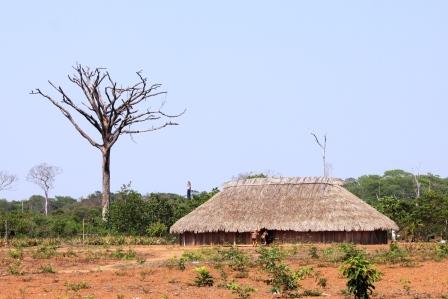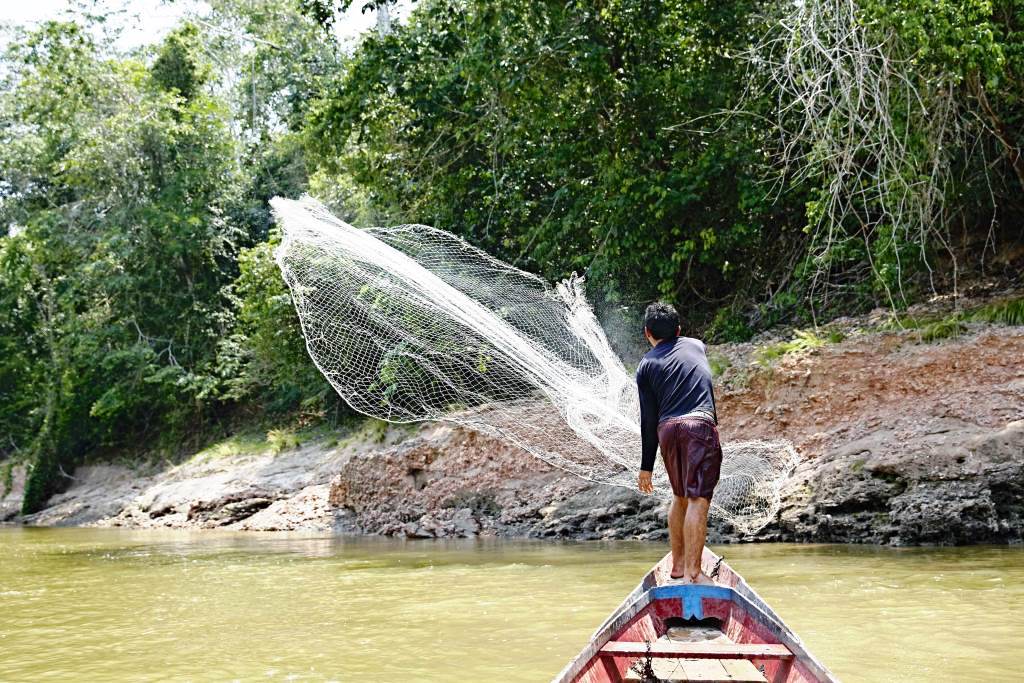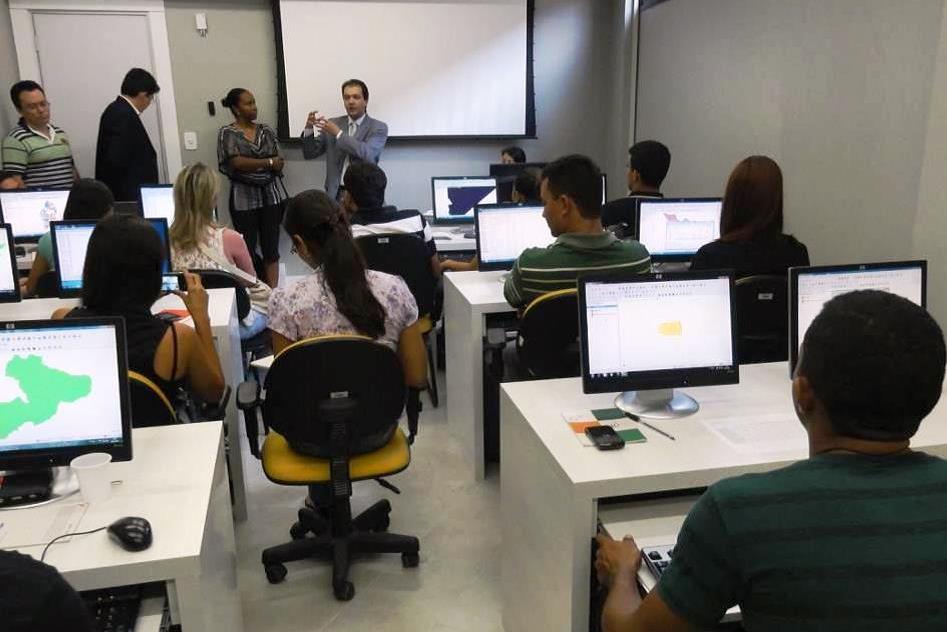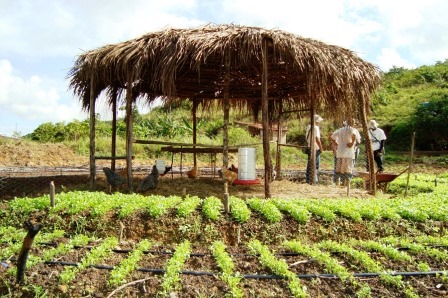RESULT AND IMPACT INDICATORS
The project activities contributed to the results related to the “sustainable production” component (1) of the Amazon Fund Logical Framework. The results of the main indicators agreed for the monitoring of expected direct effects are presented below.
Direct effect 1.1:economic activities of sustainable use of forest and biodiversity conducted in the northwest region of Mato Grosso.
- Annual revenue from sustainable use economic activity – in natura products (R$) (outcome indicator)
Goal: not set | Result achieved: R$ 1.1 million/year
Revenue generation is one of the main effects expected from sustainable production projects. It is based on the assumption that environmentally sustainable production combined with income generation increases interest and support for use of land and biodiversity consistently with forest conservation. During the project execution period, annual gross revenue from the sale of in natura Brazil nuts increased from R$ 559,000 (2013) to R$ 1.1 million (2018).
Direct effect 1.2: chains of agroforestry and biodiversity products with increased added value in the northwest region of Mato Grosso.
- Annual revenue from sustainable use economic activity – processed products (R$) (outcome indicator)
Goal: not set | Result achieved: R$ 2.8 million/year
In the analysis of this indicator’s evolution throughout project implementation, there was significant increase in annual revenue from the commercialization of products processed by Coopavam and AMCA, which grew from R$ 441,000 in 2013 to R$ 2.8 million in 2018, that is, it was multiplied by six. With support from the project, a total revenue increase of R$ 5 million was observed. This increase is calculated by comparing annual revenue in a given year with the baseline revenue. This annual increase is added over the years of project execution and, when consolidated, represents the revenue increase resulting from the project.
It can be affirmed that the results of this project, as to the generation of occupation and income, are differentiated, having comprised the implementation of extractive activities in TIs and in an agrarian reform settlement, in addition to expansion of Brazil nut processing capacity by community industrial units, certification, creation of own brand and successful commercialization of this production.
- Number of individuals directly benefited by the activities supported by the project (outcome indicator)
Goal: 1,500 individuals | Result achieved: 2,767 individuals
A total of 2,767 people participated and benefited directly from the Forest Sentinels project, of which 999 were women and 1,195 were indigenous persons, in addition to family farmers.
Direct effect 1.3: expanded managerial and technical capacity for the conduct of good practices for management of nontimber forest products, cooperativism and management of associations in the northwest region of Mato Grosso.
- Number of individuals trained in good practices for management of nontimber products, cooperativism, management of associations and processing of nuts effectively using the knowledge acquired (outcome indicator)
Goal: 100 individuals | Result achieved: 697 individuals
- Number of community organizations strengthened (outcome indicator)
Goal: six organizations | Result achieved: six organizations
Two nonindigenous organizations (Coopavam and AMCA) and four indigenous organizations – (i) Mayrob Indigenous Village Community Association (Acaim); (ii) Kawaiwete Indigenous Association; (iii) Munduruku Institute; and (iv) Passapkareej Association – participated in and were directly benefited by the project. In addition to the community organizations directly involved in the project, three other indigenous ethnic groups were strengthened with the partnership for commercialization of the nuts with Coopavam, namely: Surui Paiter and Zoró, from the states of Rondônia and Mato Grosso, and Kayapó (Mebêngôkre), from Novo Progresso, in the state of Pará.
- Improvement in the quality of the in natura nuts (outcome indicator)
Goal: 0% aflatoxin index | Result achieved: 0% aflatoxin index
Brazil nuts are tasty and have high nutritional value, being rich in selenium, proteins, vitamins and unsaturated fatty acids. Despite being a quality food, there is a risk of contamination by mycotoxins (toxins produced by fungi) with harmful effects on human health¹. The project provided trainings on good practices for hygiene and management of the Brazil nut production chain, which presented the possible sources of contamination of nuts by aflatoxins and the ways to avoid contamination and proliferation of fungi. During the project execution, laboratory analyses were performed to identify aflatoxins in Brazil nuts that did not identify the presence of fungi at a higher level than allowed.
- Number of women in management or coordination positions at Coopavam and AMCA (outcome indicator)
Goal: 15 women | Result achieved: 34 women
Since its conception, the project sought to enhance the women’s role in the nut production process, and one of the institutions that are part of the project is a women association (AMCA). From a baseline of ten women in management or coordination positions at Coopavam and AMCA, a total of 34 women with these positions was achieved, having exceeded the number expected for this indicator (15 women).
Institutional and administrative aspects
The Forest Sentinels project was conceived in partnership with the Association of Rural Development of Juruena (Aderjur) and by a group of organizations that already worked in network developing the local Brazil nut production arrangement in the northwest of Mato Grosso and, therefore, composes the institutional arrangement of this project, namely: Coopavam, as an agglutinating institution responsible for the implementation of the project with the Amazon Fund (BNDES) and five partner (“agglutinated”) institutions: (i) Mayrob Indigenous Village Community Association (Apiaká Representative); (ii) Kawaiwete Indigenous Association (Kayabi representative); (iii) Munduruku Institute; (iv) Pasapkareej Indigenous Association (Cinta Larga representative); and (v) AMCA.
The project execution had the consent of the National Indian Foundation (Funai) to carry out commercial activities between Coopavam and the indigenous peoples. With regard to the capacity building and training of people, the project established partnerships with the Brazilian Service for Support to Micro and Small Enterprises (Sebrae) and with the National Service of Industrial Learning (Senai), through the SebraeTec Program, a national program to bring innovation to small enterprises.
Training was developed to train people in associativism and cooperativism, preparation of business plans, development of a new brand for products, considering the indigenous origin of products and the socioenvironmental appeal , in addition to production of a new label for the cereals bar of Coopavam and for the nut candy of AMCA, in addition to the registration of Coopavam in the Integrated Foreign Trade System (Siscomex), the national agency responsible for the control of exports of products to other countries.
The project also had partnership with the State University of Mato Grosso (Unemat), with the publication of doctoral student research, master’s student research and undergraduate program conclusion work on the project, and one of the studies resulted in the publication of a book on actions of good practices of collection and processing of Brazil nuts for distribution to project participants.
Another important partner was the National Supply Company (Conab), with financial support for the formation of Brazil nut stocks and with the Food Acquisition Program (PAA) through the acquisition of processed nut products for the institutional market, which reached 40,000 people in eight municipalities of Mato Grosso.
Throughout the project, a partnership was also established with the Climate and Land Use Alliance (Clua)² for the creation of a solidary revolving fund to support the working capital of the Brazil nut of the Forest Sentinels network. Finally, the Forest Sentinels network was included in the Produce, Conserve and Include Initiative (PCI) of the state of Mato Grosso government, whose objectives, among others, are expanding and increasing the efficiency of agricultural and forestry production, through the control of deforestation and the development of a low-carbon economy.
² Collaborative alliance of foundations dedicated to the preservation of forests and biodiversity. It was created by the Ford, Gordon & Betty Moore, David & Lucile Packard and Climate Works foundations.
Risks and lessons learned
The Forest Sentinels project had a management board that brought together representatives of the various organizations participating in the project. The existence of this board allowed the difficulties encountered during the implementation of the project to be overcome more quickly and more amicably between the different populations and ethnic groups.
Another important aspect was the presence on site of a technical team contracted by the project to assist the indigenous persons in improving the process of collecting and storing the nuts. The direct contact of technicians with the communities strengthened the relationship of trust between the extractors and the cooperative. In addition, Coopavam adopted the strategy of establishing, at the beginning of the harvest, contracts between extractors and the cooperative with agreed prices and volumes of nuts, which streamlined the collection work and improved the planning of field activities, reducing unnecessary travel costs, with higher volumes of product to be transported on each trip, increasing the profit of extractors.
As Brazil nut is a product derived from sociobiodiversity, its productivity is impacted by climatic conditions over time. In particular, during the project, there was a decrease in the production of nut trees in the 2016-2017 crop throughout the Amazon, which led to reduction in Coopavam’s nut stocks and difficulty in signing contracts with customers due to lack of raw materials. This problem was compounded by the presence of middlemen that spread throughout the territory, increasing competition for the acquisition of raw material. In the following year, there was a strong recovery of the production capacity of the nut trees, which led to a production above normal throughout the Amazon.
The asymmetry between supply and demand caused large variations in nut price, which, in the case of Coopavam, could be reduced due to the creation of a financial mechanism that functioned as a solidary revolving fund and that allowed financing the acquisition of a portion of the nuts with subsidized interest, enabling the acquisition of a larger volume of nuts than originally planned for the formation of stocks. Another important factor to make the crop viable was the diversification of products derived from nut, especially nut oil.
Sustainability of the results
The sustainability of the results is related to the viability of the Brazil nut value chain remaining as the main source of income and improvement of life of traditional populations that inhabit the forest, constituting an alternative to deforestation.
Capacity building actions, with the adoption of good practices for the collection and management of the nuts, contribute to the continuation of the actions, by raising awareness and engaging extractive populations in the conduct of sustainable activities. In addition, the dissemination materials prepared within the scope of the project are permanent sources of information, in addition to contributing to attract new customers and supporting partners to the region.
Throughout the project, a business plan was also structured, which presents Coopavam’s vision, mission and values, comprising a market analysis for products derived from nuts with potential customers, competitors and suppliers. Among
other pieces of information, this plan comprised a financial analysis, with estimates of fixed investments and working capital; an operational analysis, addressing production capacity, operational processes and the need for personnel; and planning of marketing actions for each of the products derived from Brazil nut.
The project was successful in strengthening the value chain of Brazil nuts and the definitive consolidation of these results will depend on the continuation of investments of this nature, especially by obtaining new supporters and partners. One of these new partners is Clua, which, between 2017 and 2018, supported the creation of a revolving fund with working capital for the purchase of nuts from indigenous persons, with a total amount of R$ 800,000.
A new partnership with Partnerships for Forests was also established, which aims to improve Coopavam’s sales and marketing strategies, as well as to strengthen forest protection through plans for indigenous territorial management³. Among these and other minor supports, the Forest Sentinels project has been attracting investments that contribute to the continuation of the development of the Brazil nut value chain in the Amazon.


